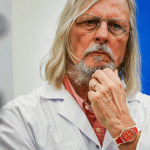Hydroxychloroquine and the ethics of treatment against the ethics of research: A reflection on the moral of the choice between care and experimentation by Prof. Didier Raoult

This is a guest post by Professor Didier Raoult, director of the IHU Méditerranée-Infection in Marseille.
Professor Didier Raoult, director of the IHU Méditerranée-Infection in Marseille, is at the heart of the controversy surrounding the use of hydroxychloroquine in Covid-19 infection. Contacted several times by “Le Quotidien”, the media infectious disease specialist replied in the form of a tribune. For the spearhead of the antimalarial, the coronavirus epidemic is an opportunity to put back in place “a reflection on the moral of the choice between care and experimentation.”
Randomized comparative studies (patients are randomly selected to receive one treatment or another) have benefited since the beginning of the 21st century from considerable enthusiasm, driven both by the pharmaceutical industry and by a new group of specialist researchers analyzes of data produced by others, that are methodologists. This approach has remained disputed, and the 2 articles, the most cited in this area, conclude that randomized trials are not superior to observational trials.
Methodologists have succeeded, in a number of cases, in imposing the idea that their thoughts represented reason, but in practice it is never more than one scientific fashion among others.
A definition was baptized, at the end of the XXth century, to know if it was authorized to make a randomized study, of the barbaric name of “Clinical equipoise”. This notion introduces the idea that one can do a randomized study only if one is certain that there is no effective treatment, otherwise it is not ethical, of course, to choose the experiment rather than care. The first duty of the doctor is care, not experimentation.
The place of anecdotal observation for infectious diseases
However, this reasonable approach is the subject of many debates among people who really practice ethics in the world, it seems absent in France. In practice, the major proponents of randomized trials ended up introducing them as the sole proof of the effectiveness of a treatment, which means that one should no longer be able to use a treatment by saying that it is effective without having is doing a randomized trial.
In my own experience, I have already developed ten different treatments, most of which are found in all medical books reporting the diseases I have worked on, without ever having done randomized trials. The elements, which generally lead to the discovery of treatments, are: anecdotal observation and observations of correctly analyzed series. It is clear, if one is curious to look at, for example, Wikipedia “Randomized Controlled Trial” in English (the one in French is, as often, poorly done), that most people recognize that the discovery does not come from the effects randomized, but individual initiatives. This is what happened in 99% of treatments for infectious diseases. In addition, for many diseases, such as AIDS or hepatitis,
Legitimacy of the placebo in question
Concerning the coronavirus, as soon as the Chinese authorities officially announced the efficacy of the drugs in the chloroquine or hydroxychloroquine group, the question arose of the legitimacy of the use of a placebo branch of experimentation. That is to say a group without drugs, in the Discovery trial. This, in terms of ethics of care, was not tenable. Circular reasoning, which is generally promoted by the proponents of a solution, must not be avoided, not in the name of science but in the name of the certainty of being right. We cannot say that to be able to save the sick, we need randomized trials, because these are carried out in a very recent way for extremely precise fields for which their contribution to the global health of the world remains for the moment to demonstrate.
Personally, I hope that the occasion of this epidemic will allow the country to really put back on the spot what the ethics committee was intended to start with, that is to say a reflection on the moral of the choice between care and the experiment, and not on the drifts that I have seen in my experience, where for example for the evaluation of the digestive microbiota of the patient infected with the AIDS virus, it was necessary to offer the patient a period of 7 days right of withdrawal to come back to get your droppings, in order to be able to change your opinion, or to impose randomized trials. These recommendations are no longer ethics but a disconnected drift, and research, and the priority of care over research. And, I believe I am also a researcher!




